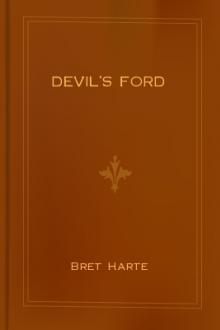Selected Stories of Bret Harte, Bret Harte [read aloud books .TXT] 📗

- Author: Bret Harte
Book online «Selected Stories of Bret Harte, Bret Harte [read aloud books .TXT] 📗». Author Bret Harte
He paused. A sudden and overwhelming idea took possession of me, and I looked impulsively into his face. Was it possible that for once Enriquez' ironical extravagance had been understood, met, and vanquished by a master hand? But the Rev. Mr. Mannersley's self-satisfied face betrayed no ambiguity or lurking humor. He was evidently in earnest; he had complacently accepted for himself the abandoned Enriquez' serenade to his niece. I felt a hysterical desire to laugh, but it was checked by my companion's next words.
“I informed my niece of the occurrence in the morning at breakfast. She had not heard anything of the strange performance, but she agreed with me as to its undoubted origin in a grateful recognition of my liberal efforts toward his coreligionists. It was she, in fact, who suggested that your knowledge of these people might corroborate my impressions.”
I was dumfounded. Had Miss Mannersley, who must have recognized Enriquez' hand in this, concealed the fact in a desire to shield him? But this was so inconsistent with her utter indifference to him, except as a grotesque study, that she would have been more likely to tell her uncle all about his previous performance. Nor could it be that she wished to conceal her visit to the fandango. She was far too independent for that, and it was even possible that the reverend gentleman, in his desire to know more of Enriquez' compatriots, would not have objected. In my confusion I meekly added my conviction to hers, congratulated him upon his evident success, and slipped away. But I was burning with a desire to see Enriquez and know all. He was imaginative but not untruthful. Unfortunately, I learned that he was just then following one of his erratic impulses, and had gone to a rodeo at his cousin's, in the foothills, where he was alternately exercising his horsemanship in catching and breaking wild cattle and delighting his relatives with his incomparable grasp of the American language and customs, and of the airs of a young man of fashion. Then my thoughts recurred to Miss Mannersley. Had she really been oblivious that night to Enriquez' serenade? I resolved to find out, if I could, without betraying Enriquez. Indeed, it was possible, after all, that it might not have been he.
Chance favored me. The next evening I was at a party where Miss Mannersley, by reason of her position and quality, was a distinguished—I had almost written a popular—guest. But, as I have formerly stated, although the youthful fair of the Encinal were flattered by her casual attentions, and secretly admired her superior style and aristocratic calm, they were more or less uneasy under the dominance of her intelligence and education, and were afraid to attempt either confidence or familiarity. They were also singularly jealous of her, for although the average young man was equally afraid of her cleverness and her candor, he was not above paying a tremulous and timid court to her for its effect upon her humbler sisters. This evening she was surrounded by her usual satellites, including, of course, the local notables and special guests of distinction. She had been discussing, I think, the existence of glaciers on Mount Shasta with a spectacled geologist, and had participated with charming frankness in a conversation on anatomy with the local doctor and a learned professor, when she was asked to take a seat at the piano. She played with remarkable skill and wonderful precision, but coldly and brilliantly. As she sat there in her subdued but perfectly fitting evening dress, her regular profile and short but slender neck firmly set upon her high shoulders, exhaling an atmosphere of refined puritanism and provocative intelligence, the utter incongruity of Enriquez' extravagant attentions if ironical, and their equal hopelessness if not, seemed to me plainer than ever. What had this well-poised, coldly observant spinster to do with that quaintly ironic ruffler, that romantic cynic, that rowdy Don Quixote, that impossible Enriquez? Presently she ceased playing. Her slim, narrow slipper, revealing her thin ankle, remained upon the pedal; her delicate fingers were resting idly on the keys; her head was slightly thrown back, and her narrow eyebrows prettily knit toward the ceiling in an effort of memory.
“Something of Chopin's,” suggested the geologist, ardently.
“That exquisite sonata!” pleaded the doctor.
“Suthin' of Rubinstein. Heard him once,” said a gentleman of Siskiyou. “He just made that pianner get up and howl. Play Rube.”
She shook her head with parted lips and a slight touch of girlish coquetry in her manner. Then her fingers suddenly dropped upon the keys with a glassy tinkle; there were a few quick pizzicato chords, down went the low pedal with a monotonous strumming, and she presently began to hum to herself. I started—as well I might—for I recognized one of Enriquez' favorite and most extravagant guitar solos. It was audacious; it was barbaric; it was, I fear, vulgar. As I remembered it—as he sang it—it recounted the adventures of one Don Francisco, a provincial gallant and roisterer of the most objectionable type. It had one hundred and four verses, which Enriquez never spared me. I shuddered as in a pleasant, quiet voice the correct Miss Mannersley warbled in musical praise of the PELLEJO, or wineskin, and a eulogy of the dicebox came caressingly from her thin red lips. But the company was far differently affected: the strange, wild air and wilder accompaniment were evidently catching; people moved toward the piano; somebody whistled the air from a distant corner; even the faces of the geologist and doctor brightened.





Comments (0)